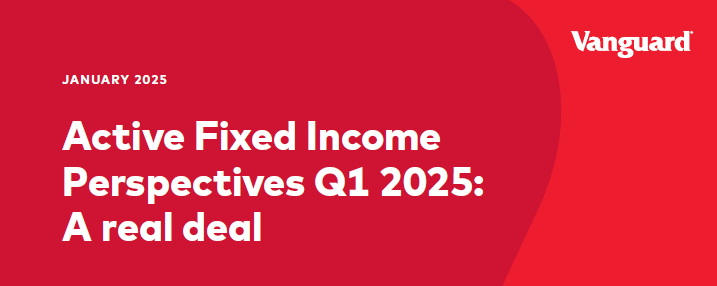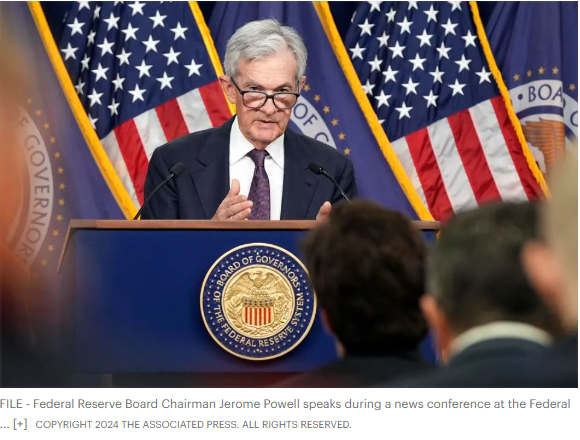Posted on March 13, 2025
How Much Does Long-Term Care Insurance Cost and Is It Worth It?
Many of us will need long-term care at some point in our lives. Still, we often ponder whether Long-Term Care Insurance is worth the cost and elect to self-insure instead. The National Council on Aging begins by taking a look at the real costs of care.
Posted on March 13, 2025
2024 Couples & Money Study
We all look at money differently. Couples are no exception. Expectations or desires can be different. So can each partner’s understanding of financial concepts and capacity. Still, the desire for financial security is very prevalent, which is why communication will always be key.
Posted on February 10, 2025
Vanguard Active Fixed Income Perspectives – 1st Quarter 2025
Bonds appear well-positioned to make a significant contribution to portfolio returns this year. In an environment where interest rates are projected to remain above inflation, the prospects for fixed income investment are favorable. However, investing is rarely without risk. Uncertainties surrounding consumer spending, tariffs, immigration, fiscal policy and deregulation could re-ignite inflation, derailing an otherwise favorable trajectory.
Vanguard Active Fixed Income Perspectives Q1 2025
Posted on February 10, 2025
New 2025 Income Tax Brackets are Set
The IRS has adjusted federal income tax bracket ranges for the 2025 tax year to account for inflation. Here’s what you need to know now.
Posted on February 10, 2025
Talking to Kids About Money
It’s never too early to develop good money habits. Starting the conversation when children are young will often have the greatest impact. Here are some basics to help parents and grandparents begin the dialogue.
Posted on January 17, 2025
2025 Outlook: Long-Term Perspective on Markets and Economies
The November election eliminated the cloud of uncertainty, that had lingered over 2024. Looking forward, we expect to see an extension of the 2017 Tax Cuts, efforts to curtail illegal immigration, the threat and possible implementation of tariffs, the possibility of some reflation, and a slightly relaxed regulatory environment which could broaden the runway for banks, financials and health care.
See the report for further information: January 2025 Outlook Report
Posted on January 17, 2025
Housing Market Unlikely to Thaw in 2025 Due to Affordability Challenges and ‘Lock-in Effect’
Fannie Mae Economists Share 5 Housing Market Predictions for New Year
WASHINGTON, DC – Affordability and the so-called “lock-in effect” are expected to keep housing activity subdued in 2025, with existing home sales forecast to move only slightly upward from recent multi-decade lows, according to the December 2024 commentary from the Fannie Mae (FNMA/OTCQB) Economic and Strategic Research (ESR) Group. The broader economy is expected to remain on solid footing and expand at an above-trend pace through 2026 as it navigates elevated core inflationary pressures and heightened policy uncertainty.
Posted on January 17, 2025
Here’s The Fed’s 2025 Meeting Schedule And What To Expect For Interest Rates
Fixed income markets anticipate that the Federal Reserve will cut interest rates in 2025, but not by much. Short-term interest rates are expected to end 2025 close to 4%. That’s down from the current 4.25% to 4.5% range as of January 2025. This is after the Fed cut rates in December 2024.
This forecast assumes that the U.S. economy continues to grow; unemployment remains slightly above 4%; and inflation ends 2025 close to 2.5%. These projections were the median forecasts of Federal Open Market Committee policymakers in December 2024. If the economy performs differently than these expectations, then the interest rate outlook will evolve, too.
Posted on November 11, 2024
Trump’s Victory Signals Major Policy Shifts Ahead
The magnitude of U.S. President-elect Donald Trump’s victory on Tuesday brings the strong likelihood he will have a mandate for his economic, market and foreign policy agenda. Winning the Electoral College and popular vote, as well as gaining Republican control of the Senate, means Trump’s key policy issues, such as tax cuts, higher tariffs and immigration curbs may come faster than expected — potentially in the early months of 2025.
Posted on November 11, 2024
Seven Medicare Changes You’ll See in 2025
Expensive medications? You’ll save thousands. Dementia or mental health care? More options
Key takeaways
- Changes from Inflation Reduction Act will take effect next year.
- Lower out-of-pocket limit in Part D drug plans erases old “donut hole.”
- You may find weight loss drugs covered to treat other medical conditions.
- Your Medicare Advantage plan may not stay the same.
- Look for a midyear statement from your MA plan.
- Caregivers for loved ones with dementia may be eligible for respite care.
- More mental health counselors are encouraged to enroll as providers.











